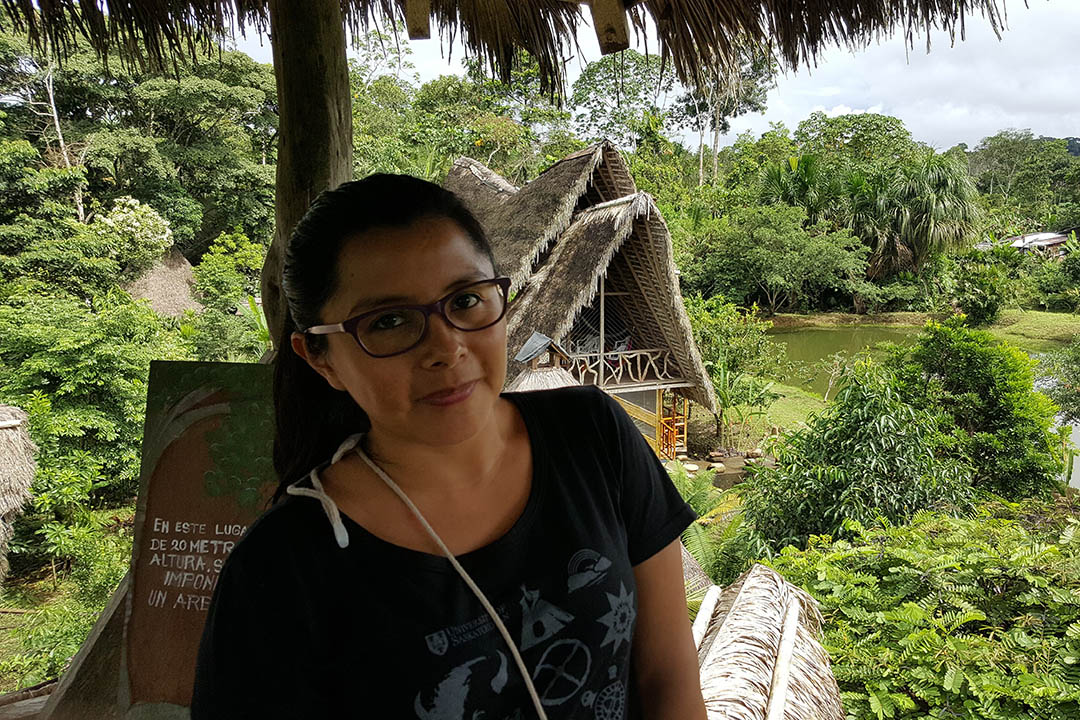
PhD graduate in search of more for Ecuador
For Dr. Veronica Santafe Troncoso (PhD), a 2021 PhD graduate from the University of Saskatchewan (USask) School of Environment and Sustainability (SENS), her doctorate is the culmination of personal, professional, and academic life experiences to date.
By Megan Evans“For me, the PhD was not the goal. The PhD was a tool for my mission in life: I want to contribute to a more sustainable and just society, no matter what role I’m in,” said Santafe Troncoso. “Whether that’s teaching, business, working in government … those are my values in life, and the PHD was a tool to help me to develop these values.”
A Latinx woman who is proud of her Indigenous and campesino roots, Santafe Troncoso has herself experienced the same struggles that impoverished families in the rural areas of Ecuador suffer, especially cultural discrimination and the lack of access to land and water sources.
“Since my childhood I have witnessed the negative environmental and social impacts that extractive industries and agribusiness have had on my community and in most of the rural communities in Ecuador,” she said. “I did my bachelor’s degree in tourism and environmental conservation because I saw tourism as an opportunity for a more sustainable and just development for my community and other rural communities in Ecuador.”
After finishing her bachelor’s degree, she decided to pursue a master’s in social and ecological studies, which provided her with a more critical perspective on tourism. Later she worked as a teacher and researcher for the School of Tourism and Hospitality at UTE University in Ecuador. There, she realized another critical issue in tourism scholarship.
“I realized that most academic resources in sustainable tourism were written by scholars who were not affiliated with institutions in Ecuador or Latin America—they were mostly written by scholars from the Global North. Being aware of this situation, I decided to pursue a doctoral degree that provides me with scientific tools to create knowledge in the tourism and sustainability fields that are contextual and representative of Ecuador and Latin American communities.”
“Exploring for PhD programs that were focused on sustainability, food systems, and Indigenous issues, I came across SENS and Dr. Philip Loring (PhD), who became my supervisor and guide during my doctoral journey,” she added. “I am one of the first scholars to connect [food sovereignty and tourism] and create a framework for empirical research.”
The idea of using her roots to advance her research is something that Loring—her doctoral advisor—also saw.
“It was an amazing experience working with Dr. Santafe Troncoso as she completed her doctoral research. She is truly a skilled qualitative researcher and has already pushed the field of sustainable tourism forward. I expect that she will quickly emerge as a leader who bridges Indigenous scholarship in the Global North and Global South,” said Loring, now an associate professor and Arrell Chair in Food, Policy and Society, at the University of Guelph, and a SENS adjunct professor.
With her PhD in hand, Santafe Troncoso is working as an entrepreneur and consultant. She owns Vital Experiences, an online store that promotes artisanal work and chocolate experiences from Ecuador. During 2020 she worked as an advisor for tourism development and multicultural entrepreneurship for local organizations and businesses in Alberta. She is also a member and does volunteer work for Ekpapalek, a non-profit organization that promotes gender equality and provides free coaching for youth and women in Latin America.
“For me, studying is a privilege,” she said. “I’m the first member of my family to finish university, to learn a new language, to travel overseas, and to get a PhD. I’m so happy when I see my sister and other women in my family developing their careers. I am grateful for the School of Environment and Sustainability, the University of Saskatchewan, and Dr. Philip Loring for giving me the opportunity to pursue my doctoral degree. Without their academic and financial support, I would not have been able to complete this important goal in my life.”
Article re-posted on .
View original article.

